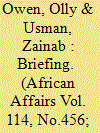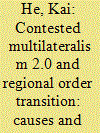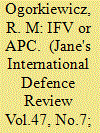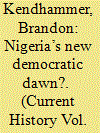|
|
|
Sort Order |
|
|
|
Items / Page
|
|
|
|
|
|
|
| Srl | Item |
| 1 |
ID:
139637


|
|
|
|
|
| Summary/Abstract |
“A DO OR DIE AFFAIR” IS A COMMON DESCRIPTION of Nigerian elections, which underlines the competitiveness and acrimony that characterize the quadrennial political ritual. The recently concluded 2015 general elections were fiercer than most, with expectations that they would end in a contentious stalemate at best, and engulf the country in violent political crisis at worst. Many people stockpiled food, the affluent and many expatriate workers took strategically timed holidays abroad, and Nigerians in regions of the country distant from their birthplaces sent their families home in expectation of a prolonged post-election crisis. Yet, in the end, the actual conduct and outcome of the elections defied expectations. Not only did Nigeria conduct its most credible and transparent elections since independence with minimal violence but, for the first time in the country's history, an opposition party – the All Progressives Congress (APC) – defeated an entrenched ruling party (the Peoples' Democratic Party, PDP). The peaceful and credible conduct of these polls has set Nigeria on a trajectory towards consolidating its democracy, transitioning from a largely unstable and expedient experiment in 1999 to the realm of political maturity. This briefing discusses how this was achieved despite the challenging context.
|
|
|
|
|
|
|
|
|
|
|
|
|
|
|
|
| 2 |
ID:
165152


|
|
|
|
|
| Summary/Abstract |
This article proposes a new concept of ‘contested multilateralism 2.0’ to describe the puzzling institutional building efforts by non-ASEAN members after the 2008 global financial crisis (GFC) in the Asia-Pacific. It suggests that different to ‘multilateralism 1.0’ of the 1990s, which was mainly led by ASEAN, this wave of multilateralism has been initiated by other powers, such as the United States, China, Japan, Australia and South Korea, either by forming new institutions or by reinvigorating existing ones. This article advances an institutional balancing argument. It suggests that ‘contested multilateralism 2.0’ is a result of institutional balancing among major states under the conditions of high strategic uncertainty and high economic interdependence after the GFC. One unintended consequence may be that it could well lead to a more peaceful transformation of the regional order in the Asia-Pacific if regional security hotspots, such as the Korean crisis and the South China Sea dispute, can be managed appropriately.
|
|
|
|
|
|
|
|
|
|
|
|
|
|
|
|
| 3 |
ID:
132234


|
|
|
|
|
| Publication |
2014.
|
| Summary/Abstract |
Tracked armoured vehicle were originally produced to enable infantry to follow tanks and support them after dismounting, but shifting operational trends are overseeing an evolution in tracked armoured vehicle developments.
|
|
|
|
|
|
|
|
|
|
|
|
|
|
|
|
| 4 |
ID:
138402


|
|
|
|
|
| Summary/Abstract |
On March 28, 2015, Nigerians returned to the polls to elect a president for the fourth time since the 1999 democratic transition. Nigeria’s Fourth Republic (1999-present) has lasted far longer than any previous attempt at civilian rule in this country of more than 175 million, encompassing an era of both remarkable growth (following a 2014 recalculation of GDP with more inclusive data, it officially surpassed South Africa as the continent’s largest economy) and worrisome social conflict. Indeed, it is possible to see Nigeria as both a rapidly modernizing success story and a deeply troubled state in which more than 35,000 citizens have died in politically motivated violence over the past four years. While its foreign direct investment inflows ($5.6 billion in 2013) put it in the company of advanced nations like France and Japan, it joins Syria, Iraq, Pakistan, and Afghanistan in a group of five countries that accounts for 80 percent of the world’s deaths from terrorism.
|
|
|
|
|
|
|
|
|
|
|
|
|
|
|
|
| 5 |
ID:
181844


|
|
|
|
|
| Summary/Abstract |
This article builds on the theoretical debate over age, period, and cohort effects (APC) and explores how these factors might affect Taiwan's partisan stability. We conducted a two-level multinomial logit random effects model using survey data from 1991 to 2020 to disentangle the APC effects. Our findings challenge Converse's core assumption that partisanship strengthens with age. As a new democracy, Taiwan's party affiliations remain fluid, and we do find evidence of period effects, particularly associated with cross-Strait crises that favor the DPP. However, generational replacement is the most significant factor driving party identity changes in Taiwan. With generational replacement, the Kuomintang is burdened by the image of a century-old party. The Democratic Progressive Party (DPP) had previously fared better among young cohorts but has recently lost its support from millennials. The youngest generation increasingly refuses to associate with the traditional political parties. It seems reasonable to expect that the new generational forces will restructure the Blue–Green cleavage and expand the ideological diversity of Taiwan's party system.
|
|
|
|
|
|
|
|
|
|
|
|
|
|
|
|
| 6 |
ID:
190456


|
|
|
|
|
| Summary/Abstract |
Polish border guards can’t stop a few dozen fast-wheeled APCs and IFVs. If such a force would cross through any road at the eastern border of Poland, it would pass almost intact. Afterward, it would be an easy target, but only before it could hide in a dense urban area. Is eastern Poland prepared for such a surprise attack of under a hundred vehicles that could arrive in many city centres within an hour after the border crossing? If a Russian force arrives at even a medium-sized city centre, they could occupy and hold such a position for weeks and use local civilians as human shields. They could force political negotiations holding also precious city infrastructure hostage. Lack of fast and decisive decision-making which is highly likely (because any bombardment will mean a loss of life of civilians) will only make any attempt to regain the city more difficult.
|
|
|
|
|
|
|
|
|
|
|
|
|
|
|
|
|
|
|
|
|